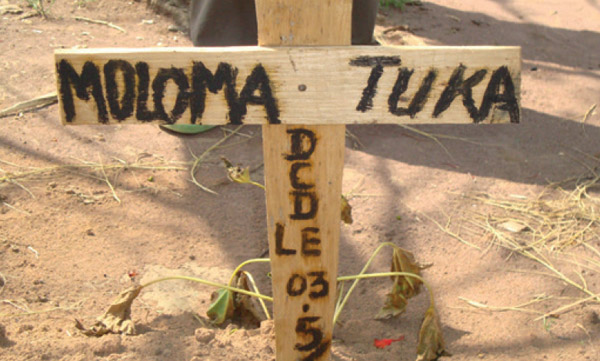 April 15, 2014 At least 908 people were murdered for taking a stand to defend the environment between 2002 and 2013, according to a new report today from Global Witness, which shows a dramatic uptick in the murder rate during the past four years. Notably, the report appears on the same day that another NGO, Survival International, released a video of a gunman terrorizing a Guarani indigenous community in Brazil, which has recently resettled on land taken from them by ranchers decades ago. According to the report, nearly half of the murders over the last decade occurred in Brazil—448 in all—and over two-thirds—661—involved land conflict.
April 15, 2014 At least 908 people were murdered for taking a stand to defend the environment between 2002 and 2013, according to a new report today from Global Witness, which shows a dramatic uptick in the murder rate during the past four years. Notably, the report appears on the same day that another NGO, Survival International, released a video of a gunman terrorizing a Guarani indigenous community in Brazil, which has recently resettled on land taken from them by ranchers decades ago. According to the report, nearly half of the murders over the last decade occurred in Brazil—448 in all—and over two-thirds—661—involved land conflict.
"There can be few starker or more obvious symptoms of the global environmental crisis than a dramatic upturn in killings of ordinary people defending rights to their land or environment," said Oliver Courtney of Global Witness. "Yet this rapidly worsening problem is going largely unnoticed, and those responsible almost always get away with it. We hope our findings will act as the wake-up call that national governments and the international community clearly need."
But as grisly as the report is, it's likely a major underestimation of the issue. The report covers just 35 countries where violence against environmental activists remains an issue, but leaves out a number of major countries where environmental-related murders are likely occurring but with scant reporting.
"Because of the live, under-recognized nature of this problem, an exhaustive global analysis of the situation is not possible," reads the report. "For example, African countries such as Nigeria, Democratic Republic of Congo, Central African Republic and Zimbabwe that are enduring resource-fueled unrest are highly likely to be affected, but information is almost impossible to gain without detailed field investigations."
In fact, reports of hundreds of additional killings in countries like Ethiopia, Myanmar, Venezuela, and Zimbabwe were left out due to lack of rigorous information.
Even without these countries included, the number of environmental activists killed nearly approaches the number of journalists murdered during the same period—913—an issue that gets much more press. Environmental activists most at risk are people fighting specific industries.
"Many of those facing threats are ordinary people opposing land grabs, mining operations and the industrial timber trade, often forced from their homes and severely threatened by environmental devastation," reads the report. "Indigenous communities are particularly hard hit. In many cases, their land rights are not recognized by law or in practice, leaving them open to exploitation by powerful economic interests who brand them as 'anti-development'."
As if to highlight these points, Survival International released a video today that the groups says shows a gunman firing at the Pyelito Kuê community of Guarani indigenous people. The incident injured one woman, according to the group. The Guarani have been campaigning for decades to have land returned to them that has been taken by ranchers.
"This video gives a brief glimpse of what the Guarani endure month after month—harassment, intimidation, and sometimes murder, just for trying to live in peace on tiny fractions of the ancestral land that was once stolen from them," the director of Survival International, Stephen Corry, said. "Is it too much to expect the Brazilian authorities, given the billions they're spending on the World Cup, to sort this problem out once and for all, rather than let the Indians' misery continue?"
According to the report, two major drivers of repeated violence against environmental activists are a lack of attention to the issue and widespread impunity for perpetrators. In fact, Global Witness found that only ten people have been convicted for the 908 murders documented in the report, meaning a conviction rate of just 1.1 percent to date.
"Environmental human rights defenders work to ensure that we live in an environment that enables us to enjoy our basic rights, including rights to life and health," John Knox, UN Independent Expert on Human Rights and the Environment said. "The international community must do more to protect them from the violence and harassment they face as a result."

 April 15, 2014
April 15, 2014